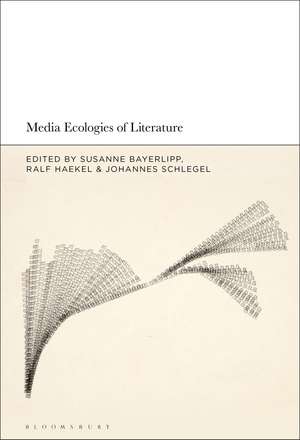Media Ecologies of Literature
Editat de Dr. Susanne Bayerlipp, Dr. Ralf Haekel, Dr. Johannes Schlegelen Limba Engleză Paperback – 26 iun 2024
| Toate formatele și edițiile | Preț | Express |
|---|---|---|
| Paperback (1) | 190.87 lei 6-8 săpt. | |
| Bloomsbury Publishing – 26 iun 2024 | 190.87 lei 6-8 săpt. | |
| Hardback (1) | 497.48 lei 6-8 săpt. | |
| Bloomsbury Publishing – 30 noi 2022 | 497.48 lei 6-8 săpt. |
Preț: 190.87 lei
Preț vechi: 249.11 lei
-23% Nou
Puncte Express: 286
Preț estimativ în valută:
36.53€ • 37.74$ • 30.40£
36.53€ • 37.74$ • 30.40£
Carte tipărită la comandă
Livrare economică 25 martie-08 aprilie
Preluare comenzi: 021 569.72.76
Specificații
ISBN-13: 9781501383915
ISBN-10: 1501383914
Pagini: 232
Dimensiuni: 152 x 229 x 25 mm
Greutate: 0.31 kg
Editura: Bloomsbury Publishing
Colecția Bloomsbury Academic
Locul publicării:New York, United States
ISBN-10: 1501383914
Pagini: 232
Dimensiuni: 152 x 229 x 25 mm
Greutate: 0.31 kg
Editura: Bloomsbury Publishing
Colecția Bloomsbury Academic
Locul publicării:New York, United States
Caracteristici
The contributions engage with pressing issues and topics, ranging from recent theoretical discussions to medial challenges of reading in everyday life brought about by audiobooks and reading apps. The book therefore appeals both to professional and general readers
Notă biografică
Susanne Bayerlipp teaches English Literature at Goethe University Frankfurt, Germany. Her research focuses on the relation between material culture, literature, and affect theory. She is currently working on a book project on compulsive hoarding in contemporary literature and culture. In 2018, she co-edited a special issue of the peer-reviewed ZAA on Cultural Techniques of Literature.Ralf Haekel is Professor and Chair of English Literature at Leipzig University, Germany. His main research interests lie in the fields of Romanticism and Media Studies. His publications include The Soul in British Romanticism (2014), the Handbook of British Romanticism (De Gruyter, 2017), and British and Irish Television Series in the 21st Century (2019).Johannes Schlegel teaches English Literature and Cultural Studies at JMU Würzburg, Germany. His PhD thesis on the anthropology and mediality of evil in British Romanticism was awarded the international Novalis Prize in 2016. In 2018, he co-edited a special issue of the peer-reviewed ZAA on Cultural Techniques of Literature.
Cuprins
1. IntroductionPart I Reading|Media|Theory2. From Work to Text Revisited: 'Reading' and the Trajectory from Literature to Media Theory(Christoph Reinfandt, Eberhard Karls Universität Tübingen, Germany)3. Media Theory as Book Theory: From the Technologies of Writing to the Materialities of Reading(Alexander Starre, Freie Universität Berlin, Germany)4. The Poetics of Et cetera: A Materialist-Semiotic Reading of George Orwell's Literary Lists(Ralph Pordzik, Julius-Maximilians-Universität Würzburg, Germany)5. Invisible Thresholds: Ben Lerner's Leaving the Atocha Station(Rieke Jordan, Goethe-Universität Frankfurt, Germany)Part II Material|Designs|Techniques6. The Cyclography of Literature(Mirna Zeman, FernUniversität Hagen, Germany)7. On Leaves: Flipping, Flicking, Turning(Sabine Zubarik, Evangelische Akademie Thüringen, Germany)8. Designing the Scene of Reading through Aestheticism and Arts and Crafts(Balázs Keresztes, Eötvös Loránd University, Hungary)Part III Digital|Spaces|Platforms9. Remediations of Canonized Literary Texts in the Digital Space: From Paratextuality to Hypermedia(Zita Farkas, Örebro University, Sweden)10. Reading Listening Interfaces: Reconfiguring Reading in the Age of Digital Platforms(Birgitte Stougaard Pedersen, Aarhus University, Denmark)11. Reading Player One: Interfaces Between Video Games and Literature(Sebastian Domsch, Universität Greifswald, Germany)Part IV Coda12. Towards a Media Ecology of Literature: The Case of Romanticism(Ralf Haekel, Universität Leipzig, Germany)
Recenzii
This is an impressive, highly nuanced and above all very helpful collection at the cutting edge of a slightly disoriented discipline in need of guidance. It addresses three related questions that are normally kept at a distance: How are scholars of literature to react to the changing media infrastructure in which texts are produced and circulated, which of the many media theories at our disposal are best suited for the task, and to what extent are these issues already at play in the texts themselves? Media Ecologies of Literature does what good collections are supposed to do--it provides surveys and samples, informed overviews, and revealing case studies. And it comes with an optimistic undertone: 'media' are not a threat to literature, they are a foundation and an opportunity.
As one of its key departure points, Media Ecologies of Literature powerfully rejects recent critical and theoretical portrayals of Kittlerian media theory as putatively 'technodeterminist.' In doing so, this transformative edited collection squarely places media materialities and affordances back into conversations with textual, semiotic, and sociocultural concerns that, as this volume's authors persuasively reveal, have always already been productively conjoined as complex media ecologies. This book will be an important resource for media studies scholars and critics seeking to explore the inherent knottiness-natural and cultural, semiotic and material, subjective and objective-of myriad cultural mediations issuing from Friedrich Kittler's 'Discourse Network 1800' to our present.
What can a book do? What can literature or files? Here are 219 pages of precise, imaginative and probing forays into this surprisingly demanding question.
As one of its key departure points, Media Ecologies of Literature powerfully rejects recent critical and theoretical portrayals of Kittlerian media theory as putatively 'technodeterminist.' In doing so, this transformative edited collection squarely places media materialities and affordances back into conversations with textual, semiotic, and sociocultural concerns that, as this volume's authors persuasively reveal, have always already been productively conjoined as complex media ecologies. This book will be an important resource for media studies scholars and critics seeking to explore the inherent knottiness-natural and cultural, semiotic and material, subjective and objective-of myriad cultural mediations issuing from Friedrich Kittler's 'Discourse Network 1800' to our present.
What can a book do? What can literature or files? Here are 219 pages of precise, imaginative and probing forays into this surprisingly demanding question.
